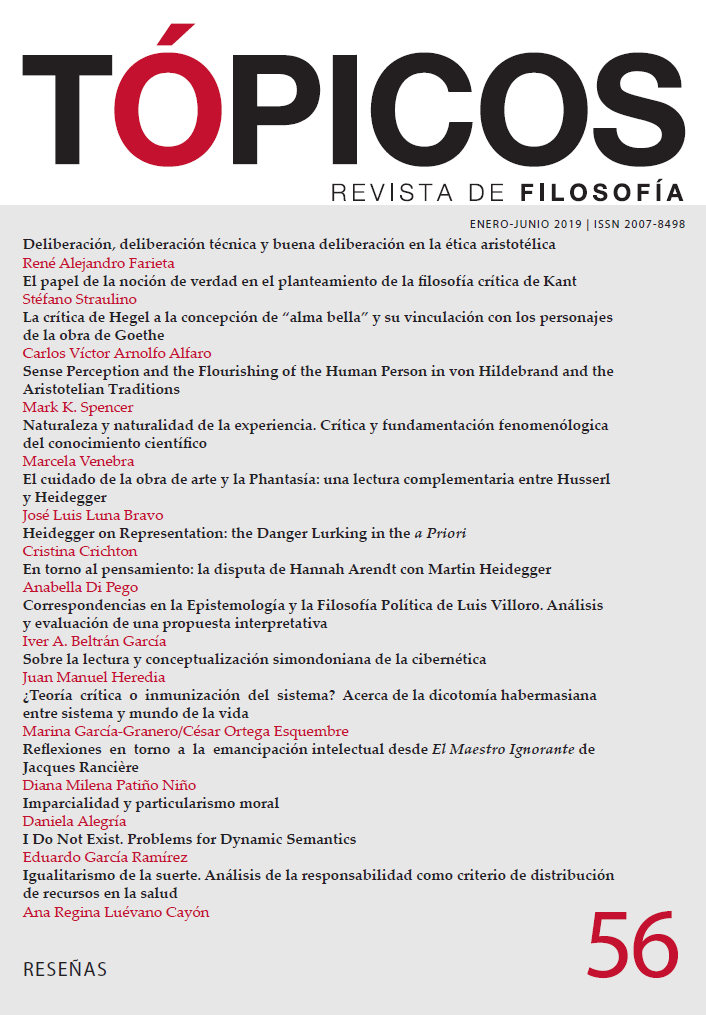Published 2018-12-13
How to Cite
Downloads
Altmetrics
Citas
Abstract
According to dynamic semantics, what is said by an utterance of a sentence is determined by how the common ground is affected by the acceptance of such utterance. It has been claimed that dynamic semantics offers an account of what is said by an utterance in a context that excels that of traditional static semantics. Assertions of negative existential constructions, of the form ‘X does not exist’, are a case in point. These assertions traditionally pose a problem for philosophers of language. A recent proposal, owed to Clapp (2008), argues that static semantics is unable to solve the problem and offers a dynamic semantics account that promises to succeed. In this paper I want to challenge this account and, more generally, the scope of the dynamic semantics framework. I will offer a counterexample, inspired by “answering machine” uses of indexical and demonstrative expressions, to show how dynamic semantics fails. I conclude by considering the merits of both static and dynamic accounts.
References
- Clapp, L. J. (2008). The Problem of Negative Existentials doesn’t Exist. Journal of Pragmatics, 41, 1422-34.
- Cohen, J. (2013). Indexicality and the Puzzle of the Answering Machine. The Journal of Philosophy, 110, 1, 5-32.
- Cohen, J. & Michaelson, E. (2013). Indexicality and the Answering Machine Paradox. Philosophy Compass, 8, 6, 580-592.
- Corazza, E., Fish, W., and Gorvett, J. (2002). Who is I? Philosophical Studies, 150, 331-348.
- Elbourne, P. (2008). Demonstratives as Individuals Concepts. Linguistics and Philosophy, 31, 409–466.
- Evans, G. (1985). Understanding Demonstratives. In G. Evans. Collected Papers. (291–321). Oxford: Oxford University Press.
- Everett, A. (2003). Referentialism and ‘Gappy’ Propositions. Philosophical Studies, 116, 1, 1-36.
- Frege, G. (1997). Thought. In M. Beaney (ed.) The Frege Reader. (325-45). Oxford: Blackwell.
- Friend, S. (2011). The Great Beetle Debate: A Study in Imagining with Names. Philosophical Studies, 153, 2, 183-211.
- Gorvett, J. (2005). Back through the Looking Glass: On the Relationships between Intentions and Indexicals. Philosophical Studies, 124, 295-312.
- Heim, I. (1983). File Change Semantics and the Familiarity Theory of Definiteness. In Meaning Use and Interpretation of Language R. Baurle, C. Schwarze, and A., von Stechow (eds.) (294-338). Berlin: De Gruyter.
- Kaplan, D. (1989). Demonstratives. In Almog, Perry, and Wettstein, (eds.) Themes From Kaplan. (481-563). Oxford: Oxford University Press.
- Lewis, D. (1980). Index, Context, and Content. In D. Lewis. Papers in Philosophical Logic. (21-44). Cambridge: Cambridge University Press.
- ----(1983). Scorekeeping in a Language Game. In D. Lewis. Philosophical Papers Vol. 1. Oxford: Oxford University Press.
- Michaelson, E. (2014). Shifty Characters. Philosophical Studies, 167, 519- 540.
- Perry, J. (1979). The Problem of the Essential Indexical. Noûs, 13, 3–21.
- Predelli, S. (1998). I Am Not Here Now. Analysis, 58, 2, 107-115. (2002). Intentions, Indexicals, and Communication. Analysis, 62, 310-316.
- ----(2011). I Am Still Not Here Now. Erkenntnis, 74, 289-303.
- Russell, B. (1905). On Denoting. Mind, 14, 56, 479-493.
- Sainsbury, R. M. (2005). Reference Without Referents. Oxford: Clarendon Press. (2009). Fiction and Fictionalism. London: Routledge.
- Stalnaker, R. (1974). Pragmatic Presupposition. In R. Stalnaker. (1999). Context and Content. Oxford: Oxford University Press.
- ----(1978). Assertion. In R. Stalnaker. (1999). Context and Content. Oxford: Oxford University Press.
- Weatherson, B. (2002). Misleading Indexicals. Analysis, 62, 4, 308-310.







